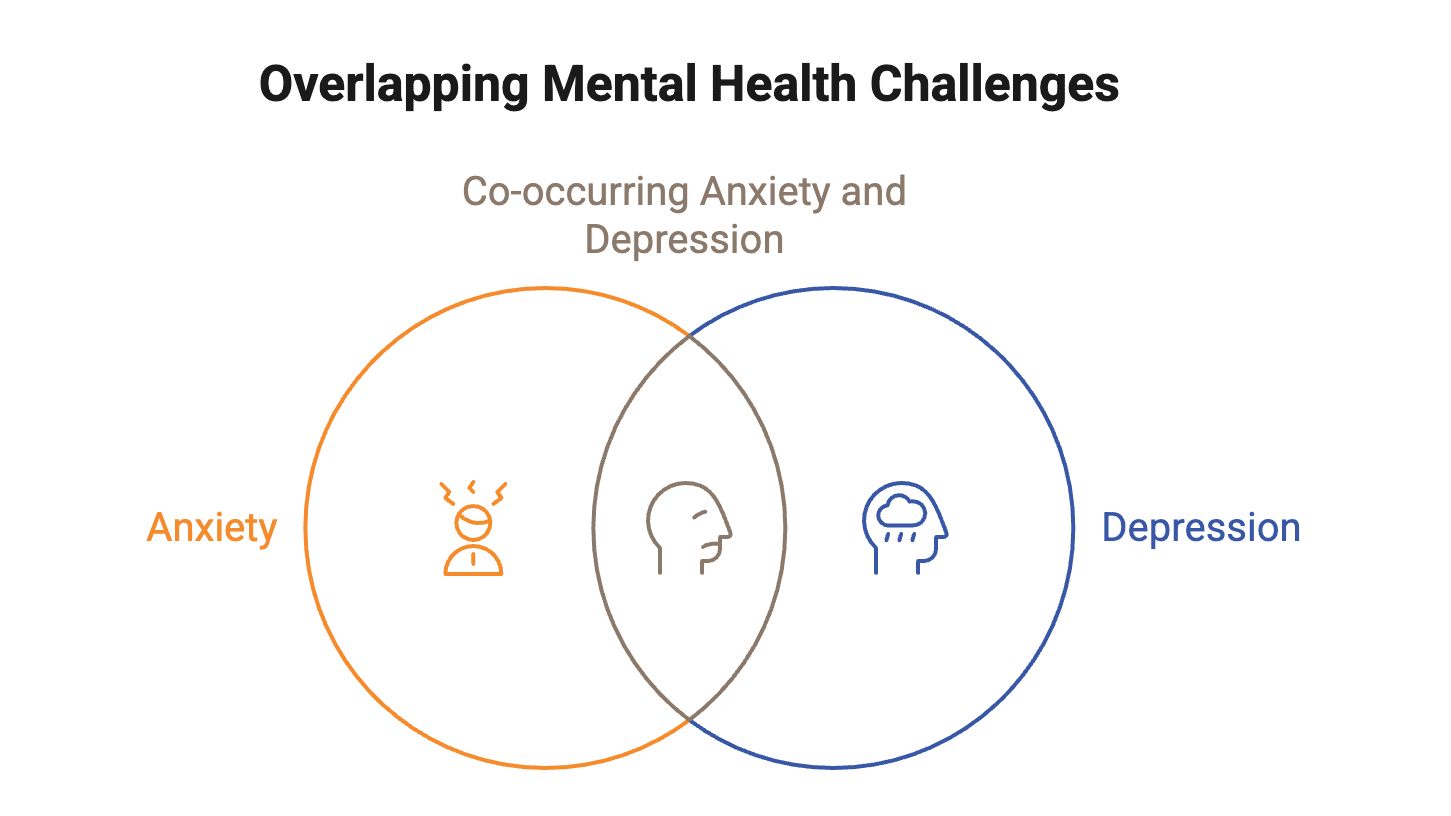First Steps: A Simple Guide to Getting Help for Anxiety and Depression
If you’re experiencing anxiety or depression, taking the first step toward getting help can feel overwhelming. You might not know where to start or what to expect. The good news is that effective treatments are available for anxiety disorders, major depressive disorder, and related mental health conditions. You don’t have to navigate this alone. This guide walks through the practical steps to get the support you need.
What Are the Signs of Anxiety and Depression?
Recognizing the warning signs is often the first step toward getting help. Anxiety and depression can manifest differently among individuals, but common depression symptoms often include ongoing sadness, a loss of interest in activities you previously enjoyed, and changes in sleep patterns or appetite.
Physical symptoms are also common. You might experience a pounding heart, sweating, trouble falling asleep, or stomach problems. Some people with generalized anxiety disorder or panic disorder describe intense fear or anxious feelings that seem to come out of nowhere. Difficulty concentrating, fatigue, and a depressed mood that lasts most of the day are other warning signs to watch for.
Social anxiety disorder (also called social phobia) can make you feel anxious in social situations, while separation anxiety involves fear about being away from loved ones. Persistent depressive disorder is a longer-lasting form of depression that affects daily life for years.
If these symptoms interfere with your work, relationships, or overall well-being, it’s time to reach out to a health care professional. You may also see your primary care provider to rule out physical health issues or medical conditions that can contribute to mental health problems.
What Is the 3-3-3 Rule for Anxiety?
The 3-3-3 rule is a simple grounding technique to manage anxiety in the moment. When you start to feel anxious, look around and name three things you see, three sounds you hear, and move three parts of your body. This technique helps reduce anxiety by shifting your focus from worried thoughts to your immediate surroundings. While helpful for managing symptoms, it’s not a replacement for professional mental health treatment.
What Are the First Steps to Getting Help?
Start by talking to a health care professional. This could be your primary care provider, a therapist, or a psychiatrist. Many people begin with their primary care doctor, who can conduct an initial screening and help you understand what you’re experiencing.
Your doctor will likely ask about your symptoms—when they started, how long they’ve lasted, and how they affect your daily life. They may use simple screening tools to assess whether you’re dealing with an anxiety disorder, major depression, or both. Taking notes about your symptoms before your appointment helps you communicate clearly.
If your symptoms are severe or persistent, your provider may refer you to a mental health professional. A psychiatrist is a medical doctor who diagnoses and treats mental health conditions, while a therapist focuses on psychotherapy approaches, also called talk therapy.
How to Help Severe Anxiety and Depression?
The most effective approach combines professional treatment with lifestyle changes. For severe anxiety and severe depression, a combination of talk therapy and medication often works best to relieve symptoms.
Psychotherapy (Talk Therapy)
Several evidence-based therapy approaches can effectively treat anxiety disorders and depression. The right approach depends on your specific needs, symptoms, and goals.
Cognitive behavioral therapy is the most effective therapy to treat anxiety disorders and depression. CBT teaches you practical skills to identify and change unhelpful thought patterns. It’s structured, goal-oriented, and typically lasts 8-20 sessions. Exposure therapy, a type of CBT, can be particularly helpful for panic disorder and social anxiety disorder.
Psychodynamic therapy (also called depth-oriented or insight-oriented therapy) takes a different approach by exploring how unconscious patterns, past experiences, and relationships shape your current symptoms. This approach can be especially helpful if you’re dealing with long-standing anxiety or depression, relationship difficulties, or patterns that seem to repeat in your life. Psychodynamic therapy typically unfolds over a longer timeframe and focuses on understanding the deeper roots of your symptoms rather than just managing them.
Many therapists integrate multiple approaches based on what you need. Some people benefit most from CBT’s practical tools, while others find that psychodynamic work creates lasting change by addressing underlying issues. Your mental health provider can help you determine which approach—or combination of approaches—is right for you.
Medications
Antidepressants are commonly used to treat both anxiety disorders and major depressive disorder. These prescription medications adjust brain chemicals involved in mood and typically take 4-8 weeks to show effects. Your mental health provider will create a treatment plan that’s right for you and monitor your progress. Never stop taking prescribed medications without talking to your doctor first.
Digital Tools
Many people benefit from online therapy platforms and CBT-based apps, especially if you prefer privacy or have trouble accessing in-person therapy appointments. These tools can effectively manage anxiety and often cost less than traditional therapy.
Lifestyle Changes That Support Mental Health
While not a replacement for professional treatment, lifestyle changes can reduce stress and improve overall well-being. Exercise, yoga, and meditation help reduce anxiety and depression symptoms.
Here are evidence-based self-care strategies:
- Get enough sleep (seven to nine hours nightly)—good sleep is essential for mental health
- Regular physical activity helps manage anxiety and improves mood
- Eat balanced meals to support your physical health
- Limit alcohol and avoid recreational drugs, which can worsen anxiety or depression
- Practice stress management techniques like deep breathing
Some people explore dietary supplements, though more research is needed on their effectiveness. Always discuss supplements with your health care provider, especially if you’re taking certain medications.
How Do I Find a Mental Health Professional in DC?
Finding the right therapist or psychiatrist doesn’t have to be complicated. Here are practical resources:
National Resources
- The Anxiety and Depression Association of America (ADAA) offers a “Find Your Therapist” tool to locate licensed mental health professionals specializing in anxiety disorders and depression
- The Substance Abuse and Mental Health Services Administration (SAMHSA) provides a national helpline (1-800-662-4357) and online treatment locator for treating mental health conditions
- The American Psychiatric Association has a “Find a Psychiatrist” directory
DC-Specific Resources
- The DC Department of Behavioral Health Access HelpLine (1-888-793-4357) connects you with mental health professionals and local providers in Dupont Circle and throughout the District
- NAMI Washington DC offers free, peer-led support groups for individuals with mental health conditions and their family members
If you have a family history of mental disorders or blood relatives with anxiety or depression, early screening can help catch symptoms before they become severe.
Can You Treat Anxiety and Depression at the Same Time?
Yes, and it’s actually very common. Close to 10% of the global population experiences both anxiety and depression simultaneously. These conditions frequently co-occur, and fortunately, many treatments work effectively for both. Some people also manage other mental health conditions like chronic pain or substance abuse alongside anxiety and depression.
Research shows that cognitive behavioral therapy and antidepressants address symptoms of both conditions. Your treatment plan may include a combination of psychotherapy and medication, along with self-care practices. Finding the right approach may take some trial and error—especially after stressful events or major life changes—but many people see significant improvement.
What If I’m in Crisis?
If you’re experiencing thoughts of self-harm or suicide, immediate help is available. Call or text 988 to connect with the 988 Suicide & Crisis Lifeline, which offers free, confidential support 24/7. You can also call 911 or go to your nearest emergency room.
Veterans can reach the Veterans Crisis Line by calling 988 and pressing 1, or by texting 838255. These services understand mental health crises and can provide immediate support.
What Can I Expect Once I Start Treatment?
You should gradually start to feel better once you begin treatment, though the timeline varies. Some people notice improvements within a few weeks, while others may need several months to find the right combination of treatments.
It’s important to communicate openly with your mental health provider about what’s working. If you’re taking medication, remember that antidepressants typically need 4-8 weeks to have a full effect. The severity and frequency of symptoms, and how long they last, vary depending on the person and the specific mental health condition.
Many people benefit from combining approaches—therapy, medication, stress management, and regular physical activity all work together to manage anxiety and depression.
Stressful situations may trigger symptoms even after you’ve started treatment, but having a solid treatment plan helps you navigate these challenges. Consider joining a support group to connect with others who understand what you’re going through.
Moving Forward
Getting help for anxiety and depression is one of the most important steps you can take for your well-being. While it’s normal to feel uncertain about reaching out, remember that anxiety disorders and depressive disorders are among the most treatable mental health issues. Health problems don’t have to control your life—effective treatments are available.
Reach out to us at the Therapy Group of DC
The therapists at Therapy Group of DC understand how difficult it can be to take that first step, and we’re here to support you. Schedule an appointment to get started.
Frequently Asked Questions About Getting Help for Anxiety and Depression
What are the physical signs of anxiety and depression?
Physical signs can include a pounding heart, sweating, stomach problems, trouble falling asleep, and fatigue. These physical symptoms often accompany the emotional and mental experiences of anxiety and depression, such as intense fear, anxious feelings, or a depressed mood.
How can lifestyle changes support mental health treatment?
Lifestyle changes like prioritizing good sleep, engaging in regular physical activity, eating balanced meals, limiting alcohol, and quitting smoking can significantly improve mental health. These habits support the body’s overall physical health and help reduce anxiety and depression symptoms alongside professional treatment.
Why is it important to consult a mental health professional for anxiety and depression?
A mental health professional can accurately diagnose your condition and develop a tailored treatment plan that may involve psychotherapy, medications, or a combination of both. They help address the underlying causes and symptoms, ensuring you receive the right treatment for your specific mental health condition.
Can physical conditions affect anxiety and depression symptoms?
Yes, certain physical conditions and medical problems can contribute to or worsen symptoms of anxiety and depression. It is important to discuss your physical health with your primary care provider to rule out or manage any underlying issues that might impact your mental health.
What should I expect from my treatment plan?
Your treatment plan may involve talk therapy, such as psychodynamic therapy or cognitive behavioral therapy, prescribed medications to adjust certain chemicals in the brain, and lifestyle changes. Finding the right treatment often involves a trial-and-error approach, and your mental health provider will closely monitor your progress to ensure the best possible outcomes.
Disclaimer: This article is for educational purposes only and is not a substitute for professional medical advice, diagnosis, or treatment. Always seek the advice of your physician or qualified mental health provider with any questions you may have regarding a medical or mental health condition. If you are in crisis or experiencing thoughts of self-harm, please call 988 (Suicide and Crisis Lifeline) or go to your nearest emergency room.


